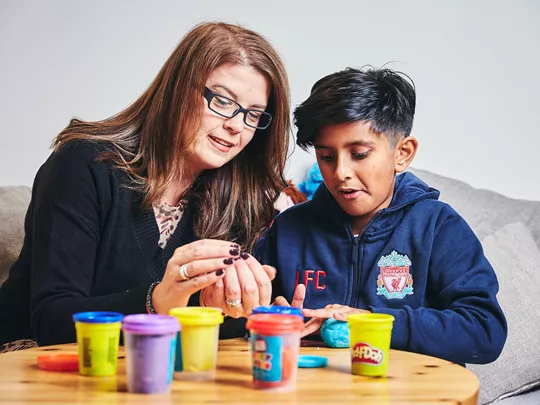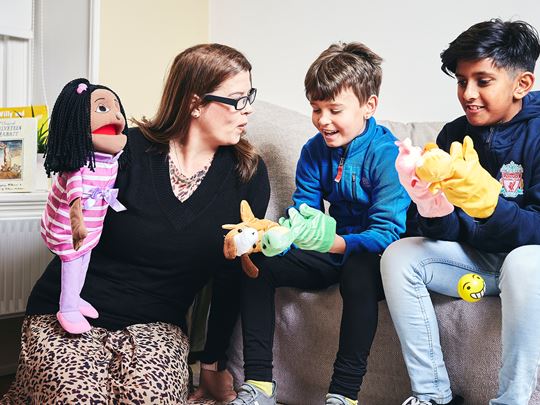At ISP, we champion therapy because we know the positive impact it can have on the lives of young people living with trauma. We believe in a therapeutic approach to fostering and that offering therapy to the young people in our care is essential to healing their trauma and helping them fulfil their potential.
When Marwa, a care leaver, began her therapy journey, she had mixed emotions about its effectiveness, “I didn’t believe in therapy before starting it. How can a person just fix me?’. Once she was ready to engage in therapy, her relationship with it didn’t blossom overnight. It took time, trials with different therapists and open communication with ISP to find the right therapist for her. Once she did, her perspective changed, and now Marwa has left care and is training to become a psychotherapist.
The Therapy Journey for Young People in Care
Why does ISP Advocate Therapy?
Many children and young people in care are living with trauma, having been through some challenging childhood experiences. Trauma affects a child’s brain development. Prolonged stress, such as abuse and neglect, can cause the brain to change because it adapts to survive these experiences.
The implications of trauma can cause the child’s brain to remain in a survival state even when there is no threat. This can lead to dissociation, hyper or hypo arousal, sensory processing difficulties, emotional dysregulation and other complexities. Therapy and our therapeutic approach to fostering can help a young person work through their trauma and build new pathways in the brain, adapted to a new way of living without prolonged threat.

ISP’S Therapy Services
At ISP, we understand that every child and young person is unique. As part of our holistic approach, each individual will undergo an initial assessment to highlight their specific needs. Once complete, our therapists will create a therapeutic support plan tailored to them.
If it’s decided that a young person would benefit from therapy, they’ll be assigned a therapist and have an initial ‘chemistry meeting’ to ensure the therapeutic relationship will work. If a young person isn’t ready to engage in therapy, we may work alongside their foster parent to deliver some kind of therapeutic intervention at home. Therapy could include Child and Adolescent Psychotherapy, Art and Play Therapy, Life Story Therapy and more.
As a foster parent, you’ll play a pivotal role in your young person’s therapy journey. You’ll receive monthly, 1-2-1 consultations with your child or young person’s therapist, where you’ll reflect on your young person’s therapy progress and goals. Through these sessions, you’ll develop a deeper understanding of their thoughts and feelings and have the opportunity to express any concerns and share your observations. Through collaboration with the therapist, who’ll share guidance and resources you can implement at home, you’ll develop therapeutic strategies to support and help your young person reach their therapy goals.
Therapy, although powerful, is just one part of the journey to recovery from trauma. Therapy is most effective when foster parents can provide a stable and nurturing home for children and young people by working with a community that collectively supports the foster family. ISP’s therapeutic pathway programme will equip you with the knowledge, skills and trusting peer community you need to help young people heal from their past experiences. You’ll also attend reflective practice groups at your local centre, an integral way to share strategies with other foster parents and learn from and support one another to fine-tune your skills.
Myths about Therapy Busted by a Care Leaver
Myth: Therapy is a Quick Fix Solution
Therapy is not a quick-fix solution; sometimes, children and young people need short-term therapy over a few months, and others need long-term therapy over several years. Care leavers, like Marwa, may also want to access therapy in adulthood, continuing their trauma recovery journey.
Therapy takes time because a relationship needs to be built between the therapist and the young person before the therapist can assist. Marwa explains, ”First, it was very much getting to know each other. And that’s so important because going straight into therapy is so intense. So it’s nice just to have the first few sessions casually chatting, just getting to know each other and then slowly opening that door.”
The relationship between therapist and young person is crucial for therapy to be impactful. It allows the sessions to flow smoothly and can help the therapist hone in on what may be happening more efficiently, enabling every session to benefit the young person.
For Marwa, building a relationship with her therapist has been essential in her therapy journey; she says, ”And now she knows everything about me and even my body language. When I come into session, she can tell straightaway what’s up. And that’s purely because we’ve worked so hard to get to that place.”
Myth: The Therapist is Judging You
When you’re talking to someone about your insecurities or the deepest secrets of your soul, it can be hard to imagine them not judging you. It can be particularly hard for young people with trauma as they may not feel able to trust adults, or the therapist might remind them of someone who has hurt them in the past.
Marwa felt this way and explains, ”I felt like, ‘Oh my god, she’s judging me’ and that made it so difficult for me to open up to her because I was scared of being judged. Not that she was.”
Therapists aren’t there to judge; they’re there to listen, understand and help children and young people work through complex issues. Sometimes, if the young person continues to feel this way, they may need to try working with another therapist.
Myth: If It Does Not Work Out with One Therapist, Then No Therapist Can Help Me
Sometimes, the young person in your care may need to change their therapist if they feel a connection is missing and the chemistry isn’t right. At ISP, we want children and young people to feel comfortable with the professionals they interact with, so they have the confidence to open up about their challenging experiences, thoughts and feelings.
Maria, a consulting centre therapist for ISP, explains, ”ISP has got such a thing as a chemistry meeting with the therapist. So, they’re getting to know each other. Only time tells and shows whether it’s the right match, and communication is ever so important.”
If the child or young person in your care feels uncomfortable with their therapist and wants to change, we encourage them to communicate this with us, as Marwa did. Marwa explains, ”The reason I’ve had more than one therapist is because it doesn’t always work out with that therapist, not because it’s the therapist’s fault or your fault. Sometimes you just don’t connect. You have to feel open to talk to a person. And especially if it’s about difficult topics.”
A young person must find the right therapist for them; as Maria says of Marwa, ”It was so important that she was able to say to us, ‘I don’t think this is working for me’ because if Marwa hadn’t told us and continued, a different process would have started. Perhaps one of resentment, perhaps one of ‘I don’t really like this, but I’m going to put up with this.’ And sometimes it takes one or two trials to get the right match.”
By communicating her feelings with the ISP team, Marwa was able to find the right therapist for her, ”Then I had another therapist, and he was absolutely amazing. He helped me so much. That was when I realised that ‘Oh my God, this is going to work; this is working.’ Like, ‘I’m feeling better, slowly, but I am.’”
Marwa changed therapists again and continues to work with her after leaving care.
Myth: Therapy is Easy
Therapy isn’t easy; it takes time and perseverance to work through trauma and recover. The child or young person in your care may not feel enthusiastic about attending therapy, nor was Marwa. She says, “Therapy wasn’t always my favourite, especially the beginning like as a teenager, I was like, ‘No, no, I don’t want to do this. I don’t want to do this’. But the more I did it, the more I appreciated it.”
As the therapists at ISP work with the young person in your care, they should hopefully begin to feel better and, like Marwa, see the changes in themselves. Marwa explains, ”Sometimes I didn’t even realise it was helping me. I would just come out of it like, ‘Well, this hasn’t helped me.’ Then, a few days later, something would change and be like, ‘Oh, okay, that’s weird.’”
Explaining Therapy to Children and Young People
When a child or young person requires a therapist’s input, you may wonder how to approach the topic with the child in your care. Here are our tips for explaining therapy to children and young people.
- Be open about what therapy entails, such as talking about feelings and using play or art to learn and grow.
- Let them know that if they don’t like their therapist, that’s okay, and you’ll help them find a more suitable therapist.
- Talk to them about confidentiality. Let them know that things discussed in therapy are written down but kept private, unless their therapist believes that they or someone else is in immediate danger. Help them understand that the therapist will also be working closely with you as a foster parent to ensure there is mutual understanding. They need to feel confident about sharing their thoughts and feelings to get the most out of therapy.
- Ensure they know that therapy is a process; they may not feel better straight away, but if they keep going to therapy, it can help them.
- Let them know that, if they want to, they can take a special item with them to help them feel comfortable.

As part of ISP’s professional support, we have created two booklets to help foster parents explain therapy to the child or young person in their care. One is for foster parents, and the other is for the child or young person. These can help you and the child in your care better understand the therapy journey.
If you’re a foster parent or are thinking about becoming a foster parent or transferring to ISP and would like further information about our therapy services, get in touch.






